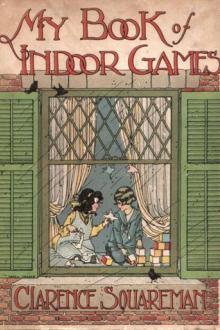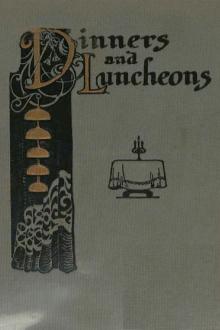My Book of Indoor Games, Clarence Squareman [primary phonics txt] 📗

- Author: Clarence Squareman
- Performer: -
Book online «My Book of Indoor Games, Clarence Squareman [primary phonics txt] 📗». Author Clarence Squareman
The players must be careful to speak in a whisper, so that the others may not know what has been said.
The game then goes on again, in the same way, until all the children have been caught and have chosen which they will be, "oranges" or "lemons." When this happens, the two sides prepare for a tug-of-war. Each child clasps the one in front of him tightly and the two leaders pull with all their might, until one side has drawn the other across a line which has been drawn between them.
Musical Chairs or Going to JerusalemThis game must be played in a room where there is a piano.
Arrange some chairs, back to back, in the center of the room, allowing one chair less than the number of players. Some one begins to play a tune, and at once the players start to walk or run round the chairs, to the sound of the music.
When the music stops, each player must try to find a seat, and as there is one chair short, some one will fail to do so, and is called "put." He must carry a chair away with him, and the game goes on again until there is only one person left in, with no chair to sit upon. This person has won the game.
The Traveler's AlphabetThe players sit in a row and the first begins by saying, "I am going on a journey to Athens," or any place beginning with A. The one sitting next asks, "What will you do there?" The verbs, adjectives, and nouns used in the reply must all begin with A; as "Amuse Ailing Authors with Anecdotes." If the player answers correctly, it is the next player's turn; he says perhaps: "I am going to Bradford." "What to do there?" "To Bring Back Bread and Butter." A third says: "I am going to Constantinople." "What to do there?" "To Carry Contented Cats." Any one who makes a mistake must pay a forfeit.
The Family CoachThis is a very good old game, and is most amusing if you can find some one who is a good story-teller.
The players sit in a circle and every one, except the story-teller, takes the name of some part of a coach or its equipments; for instance, door, step, wheels, reins, box-seat, and so on.
When all are ready, the story-teller begins a tale about an old coach and what happened to it, how it went on a journey, came to grief, was mended, and started off again. The story should be told fluently, but not too quickly. Every time any part of the coach is mentioned, the player who has taken that name must rise from his seat and then sit down again.
Whenever "the coach" is mentioned, all the players, with the exception of the story-teller, must rise. Any one who fails to keep these rules must pay a forfeit.
Drop the HandkerchiefA ring is formed by the players joining hands, whilst one child, who is to "drop the handkerchief," is left outside. He walks round the ring, touching each one with the handkerchief, saying the following words:
"I wrote a letter to my love,
But on my way, I dropped it;
A little child picked it up
And put it in his pocket.
It wasn't you, it wasn't you,
It wasn't you—but it was you."
When he says "It was you," he must drop the handkerchief behind one of the players, who picks it up and chases him round the ring, outside and under the joined hands, until he can touch him with the handkerchief. As soon as this happens, the first player joins the ring, whilst it is now the turn of the second to "drop the handkerchief."
Magic MusicOne of the players is sent out of the room, and the rest then agree upon some simple task for her to perform, such as moving a chair, touching an ornament, or finding some hidden object. She is then called in and some one begins to play the piano. If the performer plays very loudly, the "seeker" knows that she is nowhere near the object she is to search for. When the music is soft, then she knows she is very near, and when the music ceases altogether, she knows that she has found the object she was intended to look for.
BuzzThis is a very old game, but is always a very great favorite. The more the players, the greater the fun. The way to play it is as follows: The players sit in a circle and begin to count in turn, but when the number 7 or any number in which the figure 7 or any multiple of 7 is reached, they say "Buzz," instead of whatever the number may be. As, for instance, supposing the players have counted up to 12, the next player will say "13," the next "Buzz" because 14 is a multiple of 7 (twice 7)—the next player would then say "15" the next "16," and the next would, of course, say "Buzz" because the figure 7 occurs in the number 17. If one of the players forgets to say "Buzz" at the proper time, he is out. The game then starts over again with the remaining players, and so it continues until there is but one person remaining. If great care is taken the numbers can be counted up to 70, which, according to the rules before mentioned, would, of course, be called Buzz. The numbers would then be carried on as Buzz 1, Buzz 2, etc., up to 79, but it is very seldom that this stage is reached.
"I Apprenticed My Son."The best way of describing this game is to give an illustration of how it is played. The first player thinks of "Artichoke," and commences: "I apprenticed my son to a greengrocer, and the first thing he sold was an A."
Second player: "Apple?" "No."
Third player: "Almonds?" "No."
Fourth player: "Asparagus?" "No."
Fifth player: "Artichoke?" "Yes."
The last player, having guessed correctly, may now apprentice his son. No player is allowed more than one guess.
Cat and MouseThe children sit in two rows opposite each other with a space between. One child takes the place of "cat," being blindfolded, and one takes the place of "mouse," and is also blindfolded, the cat standing at one end of the row and the mouse at the opposite end. They start in opposite directions, guiding themselves by the chairs, the cat trying to catch the mouse. When the mouse is caught it is made the cat, and one of the company takes the place of the mouse.
The Sea KingThis game can be played by any number of children. They proceed by first choosing one of the party to act as the Sea King, whose duty it is to stand in the center of a ring, formed by the players seating themselves round him. The circle should be as large as possible. Each of the players having chosen the name of a fish, the King runs round the ring, calling them by the names which they have selected.
Each one, on hearing his name called, rises at once, and follows the King, who, when all his subjects have left their seats, calls out, "The sea is troubled," and seats himself suddenly. His example is immediately followed by his subjects. The one who fails to obtain a seat has then to take the place of King, and the game is continued.
Buff Says "Baff"This is a game in which no one is allowed to smile or laugh. All the players, except one, sit in a row or half circle; one goes out of the room and returns with a stick or poker in his hand, and a very grave and solemn face. He is supposed to have just returned from a visit to Buff. The first player asks him: "Where do you come from?" "From Buff." The next asks: "Did he say anything to you?" To which the reply is:
"Buff said 'Baff,'
And gave me this staff,
Telling me neither to smile nor to laugh.
Buff says 'Baff,' to all his men,
And I say 'Baff' to you again.
And he neither laughs nor smiles,
In spite of all your cunning wiles,
But carries his face with a very good grace,
And passes his staff to the very next place."
If he can repeat all this without laughing, he delivers up his staff to some one else, and takes his seat; but if he laughs, or even smiles, he pays a forfeit before giving it up.
Blind Man's BuffIn the olden times this game was known by the name of "Hood-man Blind," as in those days the child that was chosen to be "blind man" had a hood placed over his head, which was fastened at the back of the neck.
In the present day the game is called "Blind Man's Buff," and very popular it is among young folk.
Before beginning to play, the middle of the room should be cleared, the chairs placed against the wall, and all toys and footstools put out of the way. The child having been selected who is to be "Blind Man" or "Buff," is blindfolded. He is then asked the question, "How many horses has your father got?" The answer is "Three," and to the question: "What color are they?" he replies: "Black, white, and gray." All the players then cry: "Turn round three times and catch whom you may." Buff accordingly spins round and then the fun commences. He tries to catch the players, while they in their turn do their utmost to escape "Buff," all the time making little sounds to attract him. This goes on until one of the players is caught, when Buff, without having the bandage removed from his eyes, has to guess the name of the person he has secured. If the guess is a correct one, the player who has been caught takes the part of "Buff," and the former "Buff" joins the ranks of the players.
Puss in the CornerThis game is really for five players only, but, by a little arrangement, six or seven children can take part in the fun.
Four players take their places in the different corners of the room, while the fifth stands in the middle. If a greater number of children wish to play, other parts of the room must be named "corners," so that there is a corner for every one.
The fun consists in the players trying to change places without being caught; but they are bound to call "Puss, puss," first, and to beckon to the one they wish to change with. Directly they leave their corners, the player in the center tries to get into one of them.
When the center player succeeds in getting into a corner, the one who has been displaced has to take his place in the middle of the room.
The PostmanFor this game all the players, except two, seat themselves in a circle. One of the two left out is blindfolded and is called the "Postman," the other is called the "Postmaster-General." Each of the players seated in the circle chooses the name of a town, which the "Post-master-General" writes down on a slip of paper, so that he may not forget it. He then calls out the names of two towns, thus: "The post from Aberdeen to Calcutta." At once, the players who have taken those names must change places, and while doing so the "Postman" must try to catch one of them.





Comments (0)